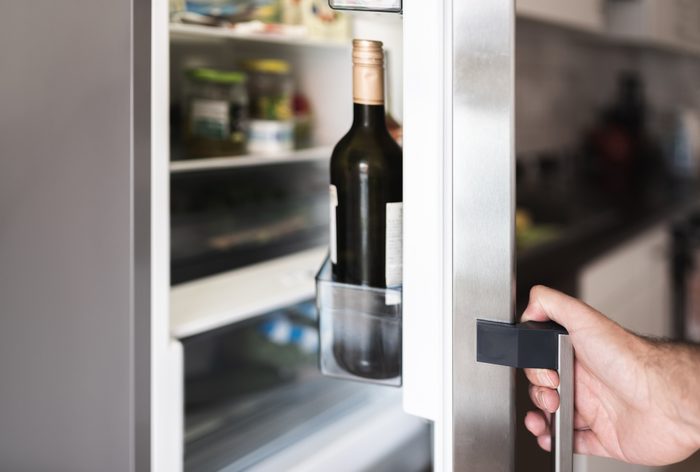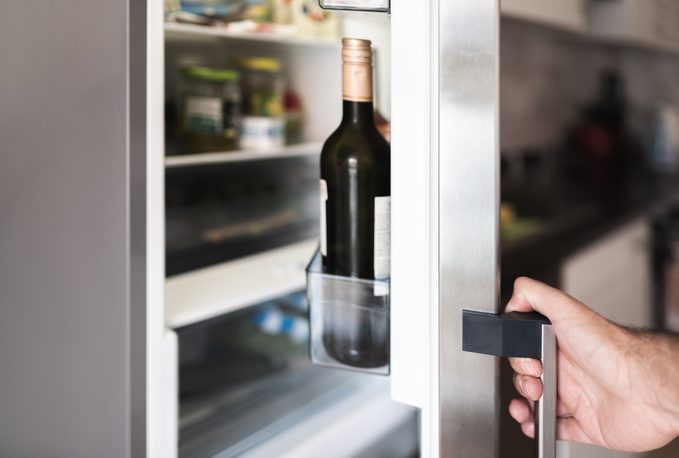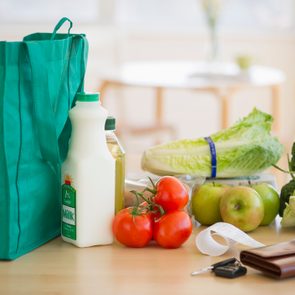16 Foods You Should Never Keep in the Fridge
Updated: Jul. 18, 2024

It can be difficult to decide what foods need to be refrigerated. Practice food safety with our expert tips on knowing where and how to store foods to enhance their flavor, nutrition value, and shelf life.
Refrigeration and food safety
All foods fare better when stored in the fridge—right? Not so fast. Keeping certain foods refrigerated slows bacterial growth and helps stave off food poisoning. But other foods do better at room temperature. Question is: Which ones? It’s not always obvious.
You know that milk, meat, and eggs are best kept in the refrigerator, but what about avocados, tomatoes and potatoes?
Knowing which foods to keep in the fridge and which ones to keep at room temperature goes a long way toward getting the most out of your groceries. We spoke with food experts who shared important food safety tips.

Tomatoes
Rich in vitamin C, potassium, and other healthful nutrients, ripe tomatoes do better when left on the counter, especially if you plan to eat them in the next day or so, says Dana Greene, RD, a registered dietitian in Boston. “The cold temperatures will affect the texture and flavor.”
A study published in 2020 in Frontiers in Plant Science, however, found no difference in color, sweetness, sourness, aftertaste, and juiciness of ripe tomatoes kept in the fridge versus those left on the counter. Unlike previous studies, the tomatoes in this study were refrigerated for only a day or two, which could account for the different findings. It could also be something about the specific crop of tomatoes examined in the study.
The One Thing You’re NOT Doing with Your Paper Towels (But Should Be)
Potatoes
Never store potatoes in the fridge. Refrigeration turns potato starch into sugar more quickly, and when baked or fried, these sugars may produce the cancer-causing chemical acrylamide, according to Public Health England, an executive agency of the Department of Health and Social Care in the United Kingdom.
Instead, store taters in a cool, dark place, suggests says Robin Foroutan, RD, integrative medicine dietitian at Morrison Center in New York City and spokesperson for the Academy of Nutrition and Dietetics. The darkness prevents them from turning green.
Winter squash
Keep winter squash in a cool, dark place, Foroutan says. The hard exterior of winter squash—whether it’s acorn, butternut, kabocha, or spaghetti squash—protects the inside flesh for extended periods of time, she says.
Coffee
It’s not uncommon to see cans of coffee in the refrigerator, but this isn’t the best place to store coffee, Greene says. “Coffee is more likely to pick up other flavors around it when it’s in the refrigerator.” She suggests keeping your ground coffee in a sealed container away from sunlight to maximize the flavor.
Does Coffee Dehydrate You? A Urologist Reveals the Truth
Bananas
If you’ve ever put a banana in the refrigerator, you know it turns dark brown, which should tell you that they are not meant to be refrigerated, Foroutan says. Bananas, which are usually bought before they’re ripe, will ripen at room temperature. But refrigeration slows down this process. “Bananas release a gas that ripens other fruit, so keep bananas away from other fruit,” she adds.
Butter
Butter and margarine slice and spread better when they are kept at room temperature and this is safe within reason, according to the United States Department of Agriculture (USDA). But leaving either of them out for several days is not a good call. Butter can grow rancid and margarine, especially the soft-tub kind, can separate into oil or water and solids. The bottom line? Keep it out if you are planning to use it within a day or two.
Basil
Herbs like basil, rosemary, and thyme will dry out too fast and lose their flavor if you keep them in the fridge, says Greene. Instead, she suggests placing herbs away from sunlight in a small glass of room-temperature water on the countertop.
Bread
Keeping bread in the fridge will protect it from mold for longer periods of time, but this may be at the expense of taste, Greene says. “Refrigerated bread gets dried out and is not as tasty,” she says. According to the USDA, bread can be stored at room temperature for two to four days, but it will last seven to 14 days in the refrigerator.
Melons
At the grocery store, you’ll find whole cantaloupe, watermelon, and honeydew in the produce section at room temperature. This is what you should do when you take whole, uncut melons home too, Greene says. Keeping whole watermelons at room temperature may even maximize their nutritional value.
When stored at room temp, watermelon has double the amount of the antioxidant beta carotene and 20 percent more lycopene, another antioxidant powerhouse, according to a study in the Journal of Agriculture and Food Chemistry.
Cut melons, however, are another story, says Greene. “Storing cut melons at room temperature can lead to rapid growth of bacteria because they no longer have the protective shell.”
Onions
Unless cut up or peeled, onions should be kept in a cool, dry, dark, and well-ventilated spot, notes the National Onion Association. Lack of ventilation will reduce their storage life. In contrast, whole peeled or pre-cut onions should be refrigerated and used before the expiration date.
Garlic
Keep fresh garlic at room temperature, too, suggests Greene. Garlic in oil mixtures, however, should be refrigerated and used or tossed out within a week to avoid botulism, according to the USDA. (Learn how to freeze fresh foods and prevent waste.)
Citrus fruits
This one is kind of up to you, Foroutan says. “Citrus fruit doesn’t have to be refrigerated, but if you’re not going to eat them right away, you can refrigerate them.” The same holds true for whole tropical fruit like mango, kiwi, and pineapple. “Be sure to eat them within two to three days if you are keeping them at room temperature.” Once cut or peeled, fresh produce should be refrigerated in covered containers or frozen in plastic freezer containers within two hours to keep it safe from bacteria.
Avocado
Keep these healthful fruits at room temperature, Foroutan says. But this counsel only makes sense if you eat your avocado stash pretty quickly.
“Otherwise, keep them in the refrigerator so they ripen slower,” she says. “If they’re still firm, take them out a day or so before using them and you’ll never miss the ripe avocado window again.” To get a rock-solid avocado to ripen faster, place it in a brown paper bag with a banana, suggests Foroutan. “The banana’s ethylene gas will ripen the avocado faster.”
16 Delicious Avocado Recipes That Will Make Your Mouth Water
Honey
Keep your honey in a tightly sealed container in a cool location away from direct sunlight, Greene says. “If you keep it in the refrigerator, it can solidify, making it harder to use,” she adds.
This Natural Sweetener May Lower Cholesterol and Blood Sugar, New Study Says
Peanut butter
Keep unopened nut butter in the pantry, Foroutan says. “Peanut butter does better in a dry, cool place,” she says. “But once you open it, refrigeration will keep it fresh longer than if you keep it in the pantry.” (Looking for a peanut butter swap? Here’s what you need to know about almond butter.)
Ketchup
Unopened ketchup will last at least a year, according to the Food Marketing Institute and Cornell University Institute of Food Science. Once opened, it should be used within a month if stored in the pantry or within six months if stored in the refrigerator. But does it belong in the fridge door…or on the shelf? We’re Ending the Debate: The Best Place to Store Condiments.


















 Foods You're Storing All Wrong" width="295" height="295" />
Foods You're Storing All Wrong" width="295" height="295" />